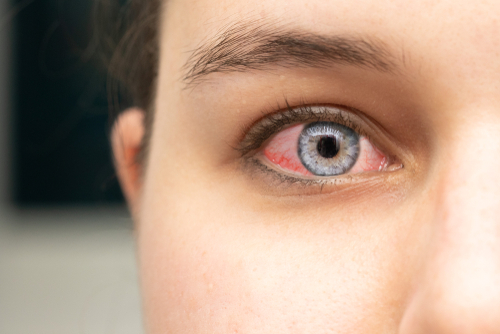
Gritty eyes can cause a sensation where your eyes feel like they have sand or grit in them, leading to an irritating and uncomfortable feeling—this sensation is often described as a gritty feeling or gritty sensation. Gritty eyes are a common complaint among patients seeking eye care.
A gritty sensation can be a common symptom of various eye conditions, including poor contact lenses, dry eye syndrome, blepharitis, and sunburned eyes.
The sensation of gritty eyes can range from mild to severe and may be accompanied by other uncomfortable symptoms such as light sensitivity, fluctuating blurry vision, red eyes or watery eyes.
If you experience persistent or severe gritty eyes, it’s essential to visit an eye doctor for proper diagnosis and treatment. Many people seek help to find relief from these symptoms. The sooner treatment is started, the better the outcome.
An eye doctor can help determine the underlying cause of your gritty eyes and recommend treatment options, such as specific artificial tears, new contact lenses, dietary changes, punctal plugs, prescription eye drops, laser therapy or other treatment.
Causes of Gritty Eyes
Dry eye syndrome is the most common cause of gritty eyes, resulting from insufficient tear production or poor tear quality. Hormonal changes can contribute to dry eye syndrome, and the condition often occurs when the tear film is disrupted, causing tears to evaporate too quickly and leading to symptoms like dryness, irritation, and a gritty sensation. Not having enough tears can compromise eye health and comfort.
Another common contributor to gritty eyes is the use of poorly fitted or outdated contact lenses, as well as overwearing lenses beyond their recommended schedule. Contact lenses that are worn too long, not properly cleaned, or made from older materials can irritate the eyes and worsen dryness. Fortunately, many newer contact lenses feature advanced lens coatings, improved plastics, and innovative designs that help maintain moisture, reduce friction, and improve overall comfort—assisting in the relief of gritty eye symptoms while supporting healthier eyes.
Other causes of gritty eyes include blepharitis, which is an inflammation of the eyelid margins. Blepharitis can result from poor eyelid hygiene, leading to buildup of oils and debris that block the meibomian glands. Dysfunction of these glands can cause insufficient or poor-quality oil in the tear film, worsening dryness and irritation. Hereditary factors can also make some individuals more prone to meibomian gland dysfunction, contributing to chronic gritty eye symptoms. Insufficient oil or not enough oil from these glands can lead to irritation. Blepharitis symptoms can include swollen eyelids, itchy eyes, and are often linked to bacterial infection. Ocular rosacea, a related skin disease, can also cause blepharitis and may present with acne like bumps on the face.
Additional causes include pink eye (conjunctivitis), which is inflammation of the clear tissue (conjunctiva) covering the white part of the eye, often accompanied by redness and involvement of blood vessels. Eye infection is another common cause, and corneal abrasion—a superficial injury to the cornea—can result in severe pain, a gritty sensation, and blurred vision.
Pterygium or pinguecula are characterized by fleshy tissue growth on the conjunctiva, often containing visible blood vessels.
Autoimmune disorders, such as Sjogren’s syndrome, are also significant contributors. Sjogren's syndrome is both an autoimmune disease and an autoimmune disorder that damages the glands responsible for producing tears and saliva, leading to dry eyes and dry mouth.
Environmental factors, such as dry air or exposure to UV radiation, can exacerbate gritty eyes and lead to severe dry eyes.
Certain medical conditions, such as thyroid disease or rheumatoid arthritis, can also contribute to gritty eyes and dry eye symptoms.
Environmental Factors and Gritty Eyes
Environmental factors, such as dry air, wind, or sun exposure, can contribute to gritty eyes by reducing tear production or causing tear evaporation. Examples include: Surfing, running, boating and golf.
Protective eyewear, such as sunglasses or safety shields, can help prevent gritty eyes caused by environmental factors.
Keeping the eyes moist with artificial tears or eye drops can also help reduce the risk of gritty eyes in dry or windy environments.
Avoiding certain activities, such as staring at screens for extended periods, can also help prevent gritty eyes and reduce dry eye symptoms.
Practicing good eye care habits, such as cleaning the eyes regularly and avoiding rubbing, can also help prevent gritty eyes.
Dry Eye Symptoms
Dry eye symptoms can range from mild to severe and may include a gritty sensation, dryness, or irritation in the eyes.
Other symptoms of dry eyes may include light sensitivity, blurry vision, or watery eyes.
In severe cases, dry eyes can cause double vision, eye pain, or severe dryness that can interfere with daily activities.
Dry eye disease can also increase the risk of eye infections or corneal damage if left untreated.
Treatment options for dry eyes may include artificial tears, prescription eye drops, or other therapies to reduce inflammation and promote tear production. Some treatments, such as steroid or medicated eye drops, can provide short term relief for severe symptoms. Home remedies, like warm compresses or using a humidifier, can be an initial approach to managing dry eye symptoms before consulting a doctor.
Contact Lenses and Gritty Eyes
Poor contact lenses can contribute to gritty eyes by reducing tear production or causing irritation, inflammation and discomfort.
Proper care and maintenance of contact lenses, including regular cleaning and replacement, can help prevent gritty eyes and reduce dry eye symptoms.
Certain types of contact lenses, such as new advanced daily disposables, may be more comfortable for people with dry eyes or gritty eyes.
An eye doctor can recommend the best contact lens options for individuals with dry eyes or gritty eyes and provide guidance on proper care, trial contact lenses and maintenance education.
In some cases, an eye doctor may recommend alternative vision correction options, such as glasses, scleral lenses, PROKERA lens, punctal plugs, medications drops or laser treatment for individuals with severe dry eyes or gritty eyes.
Eye Doctor Honolulu
If you’re experiencing gritty or irritated eyes, don’t wait to get relief. At Kahala Eye Clinic, conveniently located in Honolulu, we provide expert eye care for patients from Manoa, Hawaii Kai, Portlock, Kahala, Aina Haina, and beyond. Our eye doctor specializes in diagnosing and treating eye irritation, dry eye, and other common eye concerns with personalized attention. Call us today to schedule your appointment and take the first step toward healthier, more comfortable eyes.




